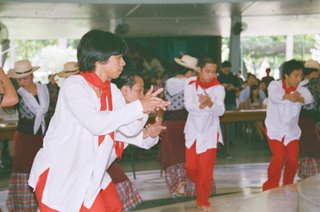
6 July 2006: Thursday of the 13th Week in Ordinary Time
Matthew 9, 1-8: Cure of the Paralytic
From Mark 2,1 we learn that this incident took place in Capernaum; and it is interesting to note that by this time Jesus had become so identified with Capernaum that it could be called his own town. At this stage in his ministry, Capernaum was the center of his work. The Gospel tells us that a paralyzed man was brought to him, carried on a bed by some friends. Here is a wonderful picture of a man who was saved by the faith of his friends. Decree 8 of the 34th General Congregation of the Society of Jesus says that friendships can "support a life of dedicated chastity" and "deepen the affective relationship with God." Let us learn from our saints.
St. John Chrysostom said that "a friend is dearer to us than the light of heaven for it would be better for us that the sun was extinguished than that we should be without friends”. One of my favorite passages in Scripture is found in St Paul's Second Letter to the Corinthians. Here the real Paul speaks so openly about his pain: "When we came to Macedonia, our flesh had no rest, but we were troubled in every way, with conflicts without, fears within. Nevertheless God who comforts the downcast, comforted us by the arrival of Titus (2 Cor 7:5-6).” When I first read this passage I had expected something different. I thought St Paul was going to say that perhaps in prayer God had directly comforted him in his difficulties. Or that perhaps God had graciously taken away his troubles, and delivered him from the conflicts and fears. To my surprise and delight Paul simply says that God Himself comforted him----through the arrival and presence of a friend!
Another favorite passage of mine from St Augustine is similar in its message and tone. Augustine says: "I confess that I give myself entirely to the love of my friends, tired as I am of the troubles of this world. In this I am perfectly at ease, for in this common love I experience God in whom I trust and in whom I take my rest in peace."
Both Paul and Augustine know something of the profound joy of friendship. They knew, by experience, what Scripture says about a good friend: "A faithful friend is a sturdy shelter; he who finds one finds a treasure. A faithful friend is beyond price....." (Sirach 6:14-15).
Life is better with friends! In fact, The Imitation of Christ puts it quite bluntly when it says: "Without a friend thou mayest not long endure." And I find it fascinating that even as Jesus, in His farewell discourse, speaks about giving us a share in His own joy, almost immediately He calls His disciples His "friends". Friendship is indeed one of the deepest joys of life.
Probably not too many would qualify for one definition of a friend given by Stuart Miller in his book Men and Friendship: "As much as anything else, friendship is the inner habit of holding someone who is neither spouse, nor relative, nor teacher, nor lover, in your heart." We can lose sight of the specialness of those whom God has given us to be genuine and real friends: persons who have become a vital part of our lives. Persons we can laugh with, cry with, enjoy with, fight with. Nevertheless, we know they are interested in me as a person, concerned about my well-being, willing to do what they can to make my life happier and for whom I have the same interests at heart. Persons whom we could say, as did St Paul when he sent Onesimus back to Philemon: "I am sending you my own heart." (Philemon v.12).
One great Christian, rich in numerous friendships, wrote these words as he grew older and wiser: “The Scriptures and the history of the Church are filled with stories of great and beautiful friendships; it seems that God has done some of His best work through friends.” St Gregory the Theologian spoke of his incomparable friendship with St Basil: "It seemed as though we two had but one soul; and though we must not hold that all things are in all things, yet you must believe that we were two in one and each in the other, having the one aim: to practice virtue and to center our life on eternity, thus passing beyond this mortal life while still in the world."
My experience confirms that our friends come "at the right time”. They come most often when I am hardly aware of needing a friend. I'm sure each friendship has its own unique "unfolding", just as each relationship is different and unique. Yet it has been helpful to me to realize that friendships, the real and lasting ones, come as a result of looking outside myself and being involved in living life and in the objective world outside my inner self.
One helpful insight (so simple and yet so profound---and that flashed on me after many years of living and "learning!") has been the realization that we are all made of the same stuff. I have tried to identify those things that have made me feel good and try my best to bring these into my own friendships. For example, I like to be affirmed as a person. I notice that whenever anyone compliments me (be it about work well done or about the color of my eyes!) I delight in this. So I do try to notice whatever I find attractive about my friends and, at the right moment, let them know this. They seem to delight in this as much as I do! It seems to me that we miss countless opportunities to do this, as we take so, so much for granted. Love is creative and finds ways to affirm and compliment and thank and to appreciate---even if in the midst of mostly routine and ordinary exchanges and chores. Love will find a way, and a right time and without overmuch protestations and self-consciousness.
Friendship is different than sexual love and attraction, which is mostly about two who gaze into each other's eyes and hearts; friendship is mostly about two or more who look together in the same direction. But even friends need the occasional and well-timed word of affirmation and gratitude if it is to abide and grow. Friends can be truthful with one another. Even if, at times, it hurts. An honest sharing of some negative feeling or some concern and even criticism has a place in any relationship that is alive, and grounded in reality. But if the negative word comes from the heart of a friend, even that honesty can make us, deep down, feel good and blessed: to have someone who cares enough and trusts me enough: another "affirmation" of my full personhood. William Blake says it well:
I was angry with my friend;
I told my wrath,
My wrath did end.
I was angry with my foe;
I told it not, My wrath did grow.
The Three-in-One God communicates His Love to us through human persons. That's why St Paul could say, so boldly, that God Himself comforted him through the visit of a friend. That's why St Augustine could say that in his friendships he experienced the God in whom he finds his rest. That's why St Gregory could say that in his friendship with St Basil he already had a foretaste of eternity. The friends we have are a precious treasure in which we learn and taste something of God's Trinitarian love for us and communicate something of our love for Him. Passing from Christ to friend, and from friend to Christ: a sign of a true spiritual friendship and a foretaste of heaven where God will be all in all! Our journey to this homeland may be long and hard. Most of us are pretty wounded people, and have more than our share of "conflicts without, and fears within." But the journey, both difficult and exciting, is surely made a lot easier with friends accompanying us along the way. A shoulder to cry on is one of friendship's offerings. As well as helping us to laugh (often at ourselves!) as only friends can do. So let's not take these treasures for granted. To our friends, our own "Tituses", let's say, from the bottom of our grateful hearts: Life is better with you! To Christ, who calls us astonishingly, "friends" (Jn 15:15), be all glory and all the love of our hearts!
*my friends from Canto Cinco (C5).









